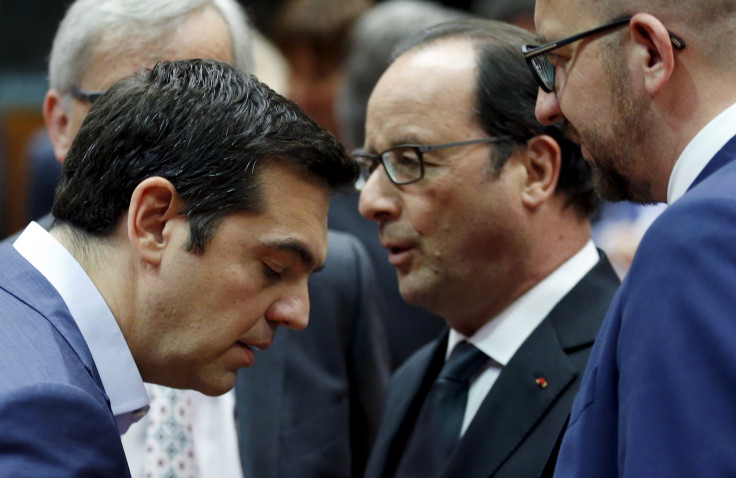Greek Debt Crisis: Greece, Creditors Reach 'Greekment' After Marathon Talks In Brussels

Update as of 3:20 a.m. EDT: A flurry of statements from European Union leaders early Monday highlighted a mix of relief as well as a sense of urgency following a unanimous agreement between Greece and its creditors that would keep the country within the currency bloc and stave off a "Grexit."
Eurogroup President Jeroen Dijsselbloem said, at a press conference, that the Greek parliament must start passing legislation immediately to implement the new measures, which require that 50 billion euros worth of Greek assets be transferred to a new fund that will be based in Athens. Of the funds, 12.5 billion euros ($13.84 billion) will be used for so-called "growth initiatives" while the remainder will be used to pay off creditors.
European Commission President Jean-Claude Juncker announced: “There is no Grexit," adding: “I don’t think the Greek people have been humiliated and I don’t think other Europeans are losing their face … It’s a typical European arrangement.”
Donald Tusk, president of the European Council, said that while the latest deal ensured continued support for Greece from the EU, the country would have to meet “strict conditions,” and warned that the Greek parliament has yet to approve the deal.
“Finance ministers will as a matter of urgency discuss how to help Greece meet her financial needs in the short term,” Tusk, who labeled Monday's deal a "Greekment," said.
Update as of 2:50 a.m. EDT: Donald Tusk, president of the European Council, has confirmed that an agreement has been reached between Greece and its creditors after more than 15 hours of negotiations in Brussels.
Tusk posted on Twitter that eurozone leaders have “unanimously reached agreement,” without revealing details of the deal.
EuroSummit has unanimously reached agreement. All ready to go for ESM programme for #Greece with serious reforms & financial support
— Donald Tusk (@eucopresident) July 13, 2015Original story:
After nearly 14 hours of deliberations between 19 European leaders, Greece continues to be stuck between a rock and a hard place -- it can either accept the eurozone's demands in exchange for a third bailout, or risk potential bankruptcy. The leaders began “final consultations” Monday, after a break, but several issues remain unresolved, according to media reports.
A Greek official told the Associated Press that as of now, there are two very large sticking points -- the involvement of the International Monetary Fund (IMF) in the proposed bailout program and the creditors' demand that Greece set aside 50 billion euros ($56 billion) worth of state-owned assets in a Luxembourg fund for eventual privatization.
The IMF’s current Greek bailout program ends in March 2016. Greece had earlier missed a deadline to repay a 1.5 billion euro ($1.67 billion) loan to the IMF, making it the first developed country to default on a loan from the institution.
An earlier four-page “compromise” proposal leaked Sunday also outlined a plan for a temporary “Grexit,” allowing the country to restructure its debt. As an alternative to the possible “time-out,” Greece has reportedly been asked to vote in sweeping changes -- including streamlining of VAT, and pension and tax reforms -- by Wednesday night, in exchange for a fresh bailout.
Here are the reforms Greece has to push through parliament by Wednesday acc to Eurogroup draft (via @tarapalmeri) pic.twitter.com/Iuqquna9LK
— Mathieu von Rohr (@mathieuvonrohr) July 12, 2015However, it is not yet clear if all eurozone leaders have endorsed the idea of a temporary Grexit.
Anger at the list of proposed demands has also triggered backlash elsewhere in Greece, with #ThisIsACoup trending on Twitter Sunday. Nobel Prize-winning economist Paul Krugman also expressed his support for the campaign, terming the Eurogroup’s demands “madness.”
© Copyright IBTimes 2024. All rights reserved.





















